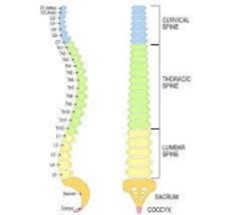When classifying spinal cord injuries, which of the following does the nurse understand is an example of the level of injury?
Quadriplegia
Incomplete loss of function
CA injury
Hyperextension
The Correct Answer is C
Choice A Rationale: Quadriplegia is a type of paralysis that affects all four limbs and the trunk, usually caused by an injury to the cervical spine (C1-C8).
Choice B Rationale: Incomplete loss of function refers to the extent of injury and whether some neurological function remains, not the level of injury.
Choice C Rationale: CA injury refers to cervical spine injury, which is the most common level of spinal cord injury.
Choice D Rationale: Hyperextension, like other mechanisms of injury (such as compression, flexion, or flexion-rotation), can contribute to spinal cord injury but does not define the level of injury.

Nursing Test Bank
Naxlex Comprehensive Predictor Exams
Related Questions
Correct Answer is A
Explanation
Choice A Rationale: Draining the bladder with a clean intermittent catheter at appropriate intervals is an essential part of managing urinary system complications in clients with spinal cord injury to prevent urinary retention and complications.
Choice B Rationale: Decreasing fluid intake is not typically recommended for individuals with spinal cord injuries, as adequate hydration is important for overall health.
Choice C Rationale: Observing the urine for a foul odor is relevant to monitor for urinary tract infections, but it is not a preventive measure.
Choice D Rationale: Keeping an indwelling catheter in place at all times is not typically recommended due to the increased risk of urinary tract infections and other complications. Clean intermittent catheterization is often preferred.
Correct Answer is B
Explanation
Choice A Rationale: hyperextension is when the neck is bent backward beyond its normal range of motion. This can happen in a rear-end collision or a fall on the back of the head.
Choice B Rationale: A spinal cord injury occurs when there is damage to the spinal cord or the surrounding structures, such as the vertebrae, ligaments, or discs. The most common cause of spinal cord injury is trauma, which can result from direct impact, penetration, or excessive force on the spine. Diving into shallow water can cause compression of the spine, which means that the vertebrae are pushed together and squeeze the spinal cord. This can damage the nerve fibers and disrupt the communicationbetween the brain and the body. Compression injuries can affect any part of the spine, but are more common in the cervical and thoracic regions.
Choice C Rationale: flexion-rotation is when the neck is bent and twisted at the same time. This can happen in a sports injury or a violent assault.
Choice D Rationale: This is when the neck is bent forward beyond its normal range of motion. This can cause the posterior part of the vertebral column to compress and fracture, while the anterior part of the spinal cord is stretched and injured. This can happen in a head-on collision or a fall on the face. A flexion-rotation is when the neck is bent and twisted at the same time.
Whether you are a student looking to ace your exams or a practicing nurse seeking to enhance your expertise , our nursing education contents will empower you with the confidence and competence to make a difference in the lives of patients and become a respected leader in the healthcare field.
Visit Naxlex, invest in your future and unlock endless possibilities with our unparalleled nursing education contents today
Report Wrong Answer on the Current Question
Do you disagree with the answer? If yes, what is your expected answer? Explain.
Kindly be descriptive with the issue you are facing.
